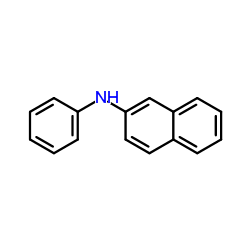N-Phenyl-2-naphthylamine

N-Phenyl-2-naphthylamine structure
|
Common Name | N-Phenyl-2-naphthylamine | ||
|---|---|---|---|---|
| CAS Number | 135-88-6 | Molecular Weight | 219.281 | |
| Density | 1.2±0.1 g/cm3 | Boiling Point | 395.5±0.0 °C at 760 mmHg | |
| Molecular Formula | C16H13N | Melting Point | 105-108 °C(lit.) | |
| MSDS | Chinese USA | Flash Point | 209.2±14.7 °C | |
| Symbol |



GHS07, GHS08, GHS09 |
Signal Word | Warning | |
|
Unusual allergic contact dermatitis to aromatic amines.
Contact Dermatitis 17(1) , 42-4, (1987)
|
|
|
Quantitative analysis of aromatic amines in human urine by gas chromatography-mass spectrometry-selected-ion monitoring.
J. Chromatogr. A. 311(1) , 141-7, (1984)
|
|
|
Dephenylation of the rubber chemical N-phenyl-2-naphthylamine to carcinogenic 2-naphthylamine: a classical problem revisited.
Crit. Rev. Toxicol. 37(7) , 553-66, (2007) N-phenyl-2-naphthylamine (PBNA) represents an example of a suspected carcinogen that is found negative in mutagenicity and clastogenicity testing as well as in long-term animal carcinogenicity bioassays in several species, but for which a carcinogenic risk ca... |
|
|
Low sensitization rate of naphthyl mix.
Contact Dermatitis 9(1) , 77, (1983)
|
|
|
[Carcinogenic risk of Neozone D (N-phenyl-2-naphthylamine)].
Vopr. Onkol. 29(7) , 91-3, (1983)
|
|
|
Anchoring metabolic changes to phenotypic effects in the chlorophyte Scenedesmus vacuolatus under chemical exposure.
Mar. Environ. Res. 69 Suppl , S28-30, (2010) In order to derive a causal understanding of toxic effects in organisms, ecotoxicology may benefit from linking molecular changes, evaluated by 'omics'-techniques, to phenotypic observations. However, an approach to link these observation levels is still lack... |
|
|
[The carcinogenic and anticarcinogenic properties of neozon D].
Vopr. Onkol. 37(1) , 60-4, (1991) Continuous administration of neozone D to dogs and rats failed to reveal its carcinogenicity. Nor did the agent potentiate the carcinogenic effect of 2-naphthylamine and benzidine in rats. Conversely, neozone D was found to inhibit benzidine-induced carcinoge... |
|
|
[Mutagenic action of latex polymerization stabilizers in various test systems].
Tsitol. Genet. 21(6) , 450-4, (1987) The cytogenetic activity of latex polymerization stabilizers (monoethanolamine, triethanolamine and neozon-D) is investigated in three different test systems. It is shown that monoethanolamine and triethanolamine are weak inductors of chromosome breaks in the... |
|
|
Julichrome Q6 glucuronide, a monomeric subunit of the julimycin B-I complex from a terrestrial Streptomyces sp.
J. Nat. Prod. 70(10) , 1545-50, (2007) The terrestrial Streptomyces sp. isolate GW6225 afforded julichrome Q 6 glucuronide ( 9), the first monomeric member of the julimycin-B complex, and additionally the julichromes Q 1.2 ( 7a), Q 1.5 ( 7b), and Q 3.5 ( 8), which were fully characterized by 2D NM... |
|
|
Biological conversion of N-phenyl-2-naphthylamine to 2-naphthylamine in the Sprague-Dawley rat.
Drug Chem. Toxicol. 6(3) , 295-309, (1983) The metabolism of a widely used plastic and rubber antioxidant, N-Phenyl-2-Naphthylamine, was investigated in Sprague-Dawley rats. After repeated oral administration of this compound, urine and feces were collected for several days and analyzed for the presen... |